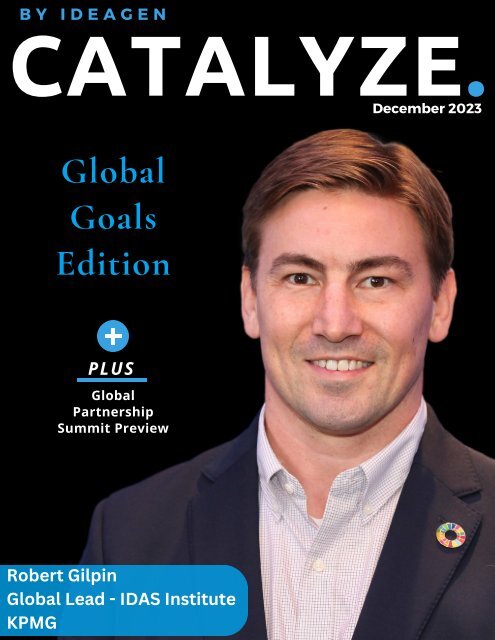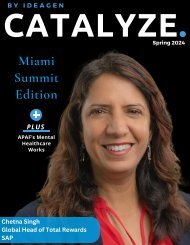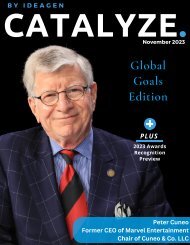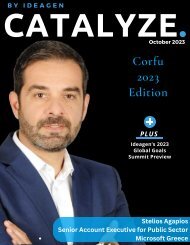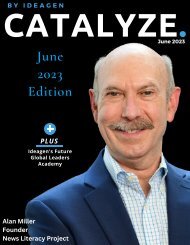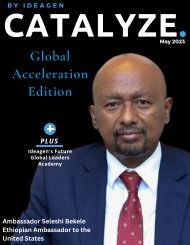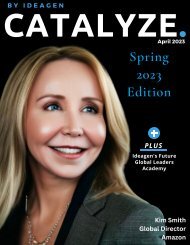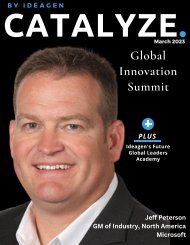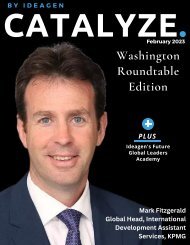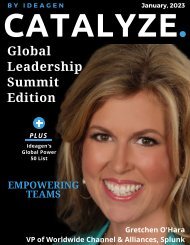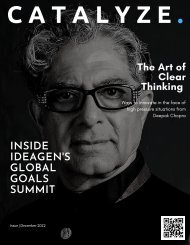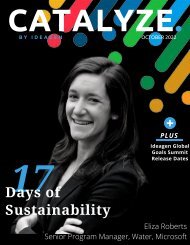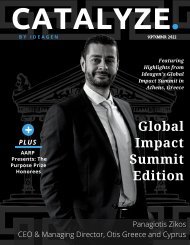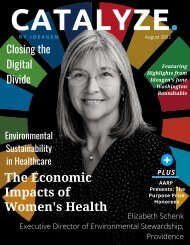Ideagen Global - Catalyze Magazine - December 2023
With Ideagen's extensive member network and influential platform, Catalyze Magazine serves as an aggregate for all the content, events, articles, and collaboration that we do. It is a monthly magazine where you will find transcriptions from Ideagen events, content, articles, and information surrounding how we are completing our mission. With this magazine, we want to highlight the nature of cross-sector collaboration and how we infuse it into our daily mission on a global scale. Ideagen's monthly Catalyze Magazine is back with our December edition. Inside, view conversations from the 2023 Global Goals Summit, hosted at the Nasdaq Global Headquarters in New York City! This months covers features speakers: Robert Gilpin, Chef Maria Loi, Rana Novack, Phyllis Ferrell, Kurt Shickman, Jonathan Parfrey, Jeff Terry, Sheri Hashemi, Elena Saviolakis, Marianthi Treppiedi, and Savas Tsivicos!
With Ideagen's extensive member network and influential platform, Catalyze Magazine serves as an aggregate for all the content, events, articles, and collaboration that we do. It is a monthly magazine where you will find transcriptions from Ideagen events, content, articles, and information surrounding how we are completing our mission. With this magazine, we want to highlight the nature of cross-sector collaboration and how we infuse it into our daily mission on a global scale.
Ideagen's monthly Catalyze Magazine is back with our December edition. Inside, view conversations from the 2023 Global Goals Summit, hosted at the Nasdaq Global Headquarters in New York City!
This months covers features speakers: Robert Gilpin, Chef Maria Loi, Rana Novack, Phyllis Ferrell, Kurt Shickman, Jonathan Parfrey, Jeff Terry, Sheri Hashemi, Elena Saviolakis, Marianthi Treppiedi, and Savas Tsivicos!
You also want an ePaper? Increase the reach of your titles
YUMPU automatically turns print PDFs into web optimized ePapers that Google loves.
B Y I D E A G E N<br />
CATALYZE.<br />
<strong>December</strong> <strong>2023</strong><br />
<strong>Global</strong><br />
Goals<br />
Edition<br />
PLUS<br />
<strong>Global</strong><br />
Partnership<br />
Summit Preview<br />
Robert Gilpin<br />
<strong>Global</strong> Lead - IDAS Institute<br />
KPMG
B Y I D E A G E N<br />
CATALYZE.<br />
<strong>December</strong> <strong>2023</strong><br />
<strong>Global</strong><br />
Goals<br />
Edition<br />
PLUS<br />
<strong>Global</strong><br />
Partnership<br />
Summit Preview<br />
Maria Loi<br />
Author, Founder of The Loi Brand<br />
Founder & Chef, Loi Estiatorio
B Y I D E A G E N<br />
CATALYZE.<br />
<strong>December</strong> <strong>2023</strong><br />
<strong>Global</strong><br />
Goals<br />
Edition<br />
PLUS<br />
<strong>Global</strong><br />
Partnership<br />
Summit Preview<br />
Rana Novack<br />
Communications Lead, TED Speaker<br />
IBM
B Y I D E A G E N<br />
CATALYZE.<br />
<strong>December</strong> <strong>2023</strong><br />
<strong>Global</strong><br />
Goals<br />
Edition<br />
PLUS<br />
<strong>Global</strong><br />
Partnership<br />
Summit Preview<br />
Phyllis Ferrell<br />
Healthcare System Program Advisor<br />
Davos Alzheimer’s Collaborative
B Y I D E A G E N<br />
CATALYZE.<br />
<strong>December</strong> <strong>2023</strong><br />
<strong>Global</strong><br />
Goals<br />
Edition<br />
PLUS<br />
<strong>Global</strong><br />
Partnership<br />
Summit Preview<br />
Kurt Shickman<br />
Urban Heat Resilience Professional
B Y I D E A G E N<br />
CATALYZE.<br />
<strong>December</strong> <strong>2023</strong><br />
<strong>Global</strong><br />
Goals<br />
Edition<br />
PLUS<br />
<strong>Global</strong><br />
Partnership<br />
Summit Preview<br />
Jonathan Parfrey<br />
Founder & CEO<br />
Climate Resolve
B Y I D E A G E N<br />
CATALYZE.<br />
Decemeber <strong>2023</strong><br />
<strong>Global</strong><br />
Goals<br />
Edition<br />
PLUS<br />
<strong>Global</strong><br />
Partnership<br />
Summit Preview<br />
Jeff Terry<br />
VP of Corporate Social Sustainability & Responsibility<br />
GAF
B Y I D E A G E N<br />
CATALYZE.<br />
November <strong>2023</strong><br />
<strong>Global</strong><br />
Goals<br />
Edition<br />
PLUS<br />
<strong>Global</strong><br />
Partnership<br />
Summit Preview<br />
Sheri Hashemi<br />
Director of Engineering<br />
L3Harris
B Y I D E A G E N<br />
CATALYZE.<br />
<strong>December</strong> <strong>2023</strong><br />
<strong>Global</strong><br />
Goals<br />
Edition<br />
PLUS<br />
<strong>Global</strong><br />
Partnership<br />
Summit Preview<br />
Elena Saviolakis<br />
Executive Director<br />
The Daughters of Penelope
B Y I D E A G E N<br />
CATALYZE.<br />
<strong>December</strong> <strong>2023</strong><br />
<strong>Global</strong><br />
Goals<br />
Edition<br />
PLUS<br />
<strong>Global</strong><br />
Partnership<br />
Summit Preview<br />
Marianthi Treppiedi<br />
Grand President<br />
The Daughters of Penelope
B Y I D E A G E N<br />
CATALYZE.<br />
<strong>December</strong> <strong>2023</strong><br />
<strong>Global</strong><br />
Goals<br />
Edition<br />
PLUS<br />
<strong>Global</strong><br />
Partnership<br />
Summit Preview<br />
Savas Tsivicos<br />
Supreme President<br />
The Order of AHEPA
TABLE OF<br />
CONTENTS<br />
01<br />
02<br />
03<br />
04<br />
Robert Gilpin<br />
<strong>Global</strong> Lead - IDAS Institute, KPMG<br />
Maria Loi<br />
Author, Founder of The Loi Brand, and Chef of Loi Estiatorio<br />
Rana Novack<br />
TED Speaker, Communications Lead for IBM, & Developer of The<br />
Foresight Model<br />
Phyllis Ferrell<br />
P r o g r a m S y s t e m s D i r e c t o r ,<br />
D a v o s A l z h e i m e r ’ s C o l l a b o r a t i v e<br />
05 GAF<br />
With Jeff Terry of GAF, Jonathan Parfrey of Climate Resolve, and<br />
Urban Heat Resilience Expert Kurt Shickman<br />
06<br />
07<br />
Sheri Hashemi<br />
Director of engineering, L3Harris<br />
AHEPA & The Daughters of Penelope<br />
With Daughters of Penelope Executive Director Elena Saviolakis,<br />
Grand President Marianthi Treppiedi, and AHEPA Supreme<br />
President Savas Tsivicos.
P A R T N E R S H I P S T O<br />
A D D R E S S G L O B A L<br />
P O L Y C R I S I S<br />
WITH ROBERT GILPIN, GLOBAL<br />
LEAD - IDAS INSTITUTE AT KPMG<br />
Robert Gilpin, KPMG<br />
Rob Gilpin: If the UN General Assembly is where the world comes to address the global<br />
development agenda, then the World Bank and IMF annual meetings, which just took place<br />
in Morocco, are where the world comes to discuss how to finance the global development<br />
agenda. I just returned from the annual meetings last week in Morocco, and they did an<br />
incredible job post-earthquake to make everything happen. They're incredibly proud to host<br />
such a prestigious global event, and they did a great job.<br />
During the continued discussions, there was this ongoing dialogue around the array of<br />
challenges that face us in the international community. You've heard about the increase in<br />
climate-related disasters, biodiversity loss coming high on the agenda, the widening of<br />
economic inequalities both within countries and across countries, the conflicts in Ukraine<br />
and, very sadly, the Middle East, and the ongoing global inflation. Now, there's a term that's<br />
emerged in international development this year to describe such issues, which is poly-crises.<br />
The rising of these events at the same time will only make financing and attaining the<br />
Sustainable Development Goals more difficult.<br />
CATALYZE MAGAZINE | 1
P A R T N E R S H I P S T O A D D R E S S G L O B A L P O L Y C R I S E S<br />
Robert: When you consider the overseas development assistance amount each year is a<br />
little over 200 billion, whereas the annual needs to achieve the SDGs are between 1.4 and<br />
3 trillion. The ODA numbers seem strikingly inadequate. If we look at the reconstruction<br />
costs of Ukraine alone, those costs are estimated to be upwards of 477 billion over ten<br />
years. Then, there are reconstruction efforts following the devastating Turkish earthquake,<br />
and the list goes on.<br />
The scale of change is absolutely huge. Recognizing the urgency of our collective action,<br />
the incoming World Bank Group president Ajay Banga, who came from the private sector<br />
at Mastercard, has already realigned the mission of the World Bank Group. They've<br />
shifted from creating a world free of poverty to creating a world free of poverty on a<br />
livable planet, and it's a crucial distinction. As the president of the World Bank said, if<br />
we're going to realize the ambition of the Paris Climate Agreement and stay within 1.5<br />
degrees, all while achieving the SDGs, there's a real need to vastly increase the scale and<br />
pace of change.<br />
CATALYZE MAGAZINE | 2
G L O B A L<br />
The Life of Loi and<br />
Maria’s Passion for<br />
Cooking<br />
With Maria Loi<br />
Author, Founder of The Loi Brand,<br />
and Chef of Loi Estiatorio<br />
Chef Maria Loi<br />
George Sifakis: Tell us a few snippets of the show. Why do people love "The<br />
Life of Loi" so much?<br />
Maria Loi: The show is just me. What you see is what you get. People always<br />
say, "Oh, you don't act," and I tell them, "No, I don't act, I react." I meet people,<br />
and when I say people, I mean real people. Authentic people. They're taking me<br />
back to what I did in my life before. Because I have a passion for cooking, and<br />
when I say passion, I mean passion. You know George, I was born a farm girl. I<br />
don't know if you know that.<br />
George: I did know you're a farm girl, and I know that you have a passion for<br />
cooking. I know you're authentic, and that's why you're here. It's all about<br />
authenticity and authentic leadership. For you, where did your passion for<br />
cooking come from, and how do you feel it is best represented in your food?<br />
Maria: As I said, passion is me. Maria Loi is full of passion. But being a farm<br />
girl from a very poor family, someone had to stay home and cook. That person<br />
was me, and I'm so glad that it was me because I love it. I was very fortunate<br />
because the food for the poor was simple, delicious, and healthy. This is the kind<br />
of food I make today, and it's the food that we should eat. That's what we have to<br />
incorporate into our lives.<br />
CATALYZE MAGAZINE | 3
T H E L I F E O F L O I A N D M A R I A ’ S P A S S I O N<br />
F O R C O O K I N G<br />
George: And food sustainability is obviously front and center. How are you working<br />
to incorporate sustainable practices into your restaurant, your products, and your<br />
overarching business practices?<br />
Maria: I want you to come one night outside Loi Estiatoria after we close. You will<br />
notice that our garbage is at least one-fifth less than other restaurants in the area. Do<br />
you know why? Because we try to minimize food waste and recycle as much as we<br />
can. Of course, we can't do everything, but we use FSC-certified recycled paper and<br />
glass for our products, which is better for the environment. We are true to it. We don't<br />
cut corners. That's how my friends and other chefs that I know are doing it, and we<br />
discuss this every week. We're proud that we're doing this in New York.<br />
CATALYZE MAGAZINE | 4
What do you do with an<br />
Idea?<br />
With Rana Novack, TED Speaker, Communications Lead for IBM,<br />
& Developer of The Foresight Model<br />
Rana Novack: What do you do with an<br />
idea? It is the name of a children's book<br />
by Kobi Yamada. My kids have it, and<br />
they love it. I've thought about this a lot.<br />
And for me, it boils down to three really<br />
simple things.<br />
Number one, pay attention. I think too<br />
often we have these ideas; things occur to<br />
us, and we dismiss them. Ideas need time<br />
and attention to grow. Number two,<br />
share it. This isn't entirely necessary, but<br />
sometimes we have ideas, and we want to<br />
keep them to ourselves. That's fine, but<br />
assuming you ever want it to live outside<br />
the boundaries of your imagination, you<br />
are at some point going to have to share<br />
it, which is scary. You have to put it out<br />
into the world and see what happens,<br />
good or bad. Number three, believe in it.<br />
If you don't believe in it, nobody else will<br />
either. When people challenge it, don't<br />
abandon your idea. Your job is to help<br />
people see it the way you see it.<br />
Rana: There's a part of me that wants to<br />
say it's easier said than done, but I<br />
actually don't think that is true. I think<br />
sharing is the easy part. In fact, I think if<br />
it's an idea that you care about, it's harder<br />
not to do those things. It's energizing to<br />
talk about it, and it's fun to think about.<br />
When people challenge your idea, you<br />
want to defend it, and you want to help<br />
them see it the way that you see it. I think<br />
the harder part is in the smaller steps<br />
along the way.<br />
CATALYZE MAGAZINE | 5
What do you do with an Idea?<br />
Rana: Here are some of the things that I've learned in my journey. Number one is about<br />
daydreaming. I recently learned, and think it is so fascinating, that they did a study and<br />
found that daydreaming enhances performance. Daydreaming is often associated with the<br />
default network in our brains and the lower-level functioning parts of our brains. It was<br />
thought that it was sort of one or another; you're either engaging the lower-level parts of<br />
your brain or the higher-level parts of your brain, which are associated with complex<br />
problem-solving. But what they found is that when you're activating the lower-level parts,<br />
when you're in that sort of self-hypnosis, and your mind is in a relaxed state, you're<br />
activating the complex problem-solving. That's what we can attribute things like an "Aha"<br />
moment or a "Eureka" moment to.<br />
Now, the inner child daydreaming part of me is still there. She still exists, and I make sure<br />
that I have time to let my mind wander whenever I'm trying to figure something out because<br />
often, the harder I try to figure something out, and the more I think about it, the harder it<br />
is. Something I refer to as mental quicksand. I stop, I go for a run, or do something to let<br />
my mind just relax, and I will always have some sort of clarity on the other side of that.<br />
That's the first thing; I deliberately dream.<br />
The second thing is about diversity. I learned about diversity and innovation, and<br />
inadvertently, I learned something about my own self-worth. For quite a long time, and<br />
sometimes even now, I felt very inadequate because I'm not a data scientist, I'm not an<br />
immigration lawyer, I'm not a researcher, I'm none of these things. However, it occurred to<br />
me that the only reason I was able to see things in a particular way, the only reason I was<br />
able to recognize the gap that I did and how we could fix it, is precisely for that reason. I<br />
don't have to be all of those things to have value. I try to keep that in mind when imposter<br />
syndrome kicks in.<br />
CATALYZE MAGAZINE | 6
W H A T D O Y O U D O W I T H A N I D E A ?<br />
Rana: Number three, I learned to trust my future self, and here's what I mean by that. I recently gave<br />
a talk in Rome, and I had to explain the concept of hindsight being 2020 because that's not a phrase<br />
that's common there. I explain that sometimes, you can only see things clearly by looking backward.<br />
At the time, I couldn't see how communications, refugees, technology, humanitarian policy, or any<br />
of those things were connected. Now, it makes sense. If I have a moment where I don't understand<br />
how things are connected or something just doesn't make sense to me quite yet, I try to keep patience<br />
in mind. Just wait longer; It'll make sense later, even if it doesn't right now.<br />
Lastly, I learned about the difference between barriers and what I call "What now" moments. A<br />
barrier is something that feels like a failure at the moment or some sort of challenge, but in reality,<br />
it's actually a growing pain. Any time I encountered a barrier, it made me think harder. It made me<br />
work harder. It made the idea and the solution stronger on the other side. I think of it more like a<br />
wall where you can see a path forward; you just have to figure out how to get to the other side.<br />
A "What now?" moment is more like a black hole. You can't see a way forward, and you're not sure<br />
that a path exists. It's much more of a dark, hopeless kind of place. You're not afraid of<br />
embarrassment or failure because whatever it is you are afraid of has probably already happened. I<br />
learned that there's only one thing that needs to happen when you're in this moment; there's only one<br />
way to get out of it, and I'd like to share a quote that I absolutely love. "Sometimes, when you're in a<br />
dark place, you think you've been buried, but you've actually been planted." That's Christine Caine.<br />
So when you're in this moment, the only thing you have to do is make a choice: Are you buried, or<br />
are you planted? And maybe what's been planted is the seed of a great idea.<br />
CATALYZE MAGAZINE | 7
2024 <strong>Global</strong><br />
Partnership Summit<br />
“Identifying Solutions A Sector Away”<br />
Streaming on <strong>Ideagen</strong> <strong>Global</strong> January 16th<br />
CATALYZE MAGAZINE | 8
P E R S O N A L B A T T L E S &<br />
C A L L S T O A C T I O N<br />
A G A I N S T A L Z H E I M E R ’ S<br />
W I T H P H Y L L I S B A R K M A N F E R R E L L<br />
H E A L T H C A R E S Y S T E M P R O G R A M<br />
A D V I S O R<br />
D A V O S A L Z H E I M E R ’ S C O L L A B O R A T I V E<br />
Phyllis Ferrell: I mentioned my own experience<br />
working with Alzheimer's disease. I spent 30 years<br />
in Life Sciences and Pharma, fifteen of those doing<br />
Alzheimer's disease research and development. Six<br />
months after I took that job on Alzheimer's disease,<br />
my dad was diagnosed. Whether you're a faith-based<br />
person or not, I can tell you that's not a coincidence.<br />
I lived the personal and professional journey with<br />
my family, and our diagnostic journey was awful.<br />
My father was a retired commander of the US Navy,<br />
Tricare for life, a veteran. He was an executive; I<br />
was actually born outside the United States because<br />
he was an expat for a very large US chemical<br />
company, and the process almost killed us.<br />
Financially, emotionally, and mentally, and I was<br />
sitting here in the space that had all the resources.<br />
Not just financial resources, but I sat in the<br />
Alzheimer's community.<br />
Phyllis Barkman Ferrell<br />
Phyllis: One of the most fun things about<br />
watching this community-in-practice at the<br />
Davos Alzheimer's Collaborative was<br />
watching the low and middle-income<br />
countries educate the high-resource<br />
countries. Sometimes, in the US, we think<br />
we've got this and that everybody should<br />
just follow us. Well, I'm here to tell you,<br />
we're as broken as all of them. One of our<br />
PIs in Kenya said when it comes to<br />
Alzheimer's disease, we're all developing<br />
nations.<br />
I could pick up the phone and call the greatest<br />
thought leaders in the world. Mark my words, this<br />
can't continue. We have to make a change. We can<br />
do better. That's become my mission. It isn't rocket<br />
science. We don't need a double-blind, placebocontrolled,<br />
randomized clinical trial that discovers a<br />
new drug. We just need to roll up our sleeves, take<br />
apart the pieces like Legos, and put them back in a<br />
way that actually supports an aging population.<br />
CATALYZE MAGAZINE | 9
P E R S O N A L B A T T L E S & C A L L S T O A C T I O N<br />
A G A I N S T A L Z H E I M E R ’ S<br />
Phyllis: A couple of calls to action for you. The first one. First, one of the scientific things we've<br />
learned is that 40% of dementias are actually preventable with lifestyle modification. Now,<br />
notice I said dementia, not Alzheimer's disease. What are those things? Well, I'm here to tell you<br />
because this is what you're going to go home and start doing today. Mediterranean diet, exercise,<br />
quit smoking, drink in moderation, cognitive engagement, social engagement, and tightly control<br />
your blood pressure.<br />
Now, here's the biggie: sleep 7 to 8 hours every night. Working moms, people who are taking<br />
care of elderly parents. You're going to laugh at me when I say that, but leave the dirty dishes in<br />
the sink and go to bed for 7 to 8 hours of sleep. It's the only time that the brain janitor and the<br />
microglia actually clean up the pathology for you. That's your number one call to action for<br />
yourself.<br />
Here's the more important call to action for every single person sitting in this room, in this chair, and<br />
everyone watching this on <strong>Ideagen</strong> TV. You are sitting in a position of influence. That's why you're<br />
here. You may be someone who actually works in a health system and can influence someone to<br />
make a change, be a champion. You may be someone who knows a funder who wants to move this<br />
field forward and is willing to provide a grant. You may be able to help a startup that is doing<br />
something in digital health or diagnostics and move this forward. You may be just willing to raise<br />
your hand and say, I don't know exactly what I can do, but from where I sit, I want to help.<br />
CATALYZE MAGAZINE | 10
P E R S O N A L B A T T L E S & C A L L S T O A C T I O N<br />
A G A I N S T A L Z H E I M E R ’ S<br />
Phyllis: So, my call to action for all of you is to figure out what that is. What seat of<br />
influence are you in? I can guarantee you, no matter what sector in, you're going to touch<br />
this disease. And I'd ask you to take it and use it. If I can help figure out how to connect<br />
you to the community, I'll do it, and I know <strong>Ideagen</strong> will do it. There are others in the room<br />
here who spend time in this space, and I'm sure you'll find somewhere in your community,<br />
in your country, in your organization, or in your sector to make an impact. We can do<br />
better. We have to do better.<br />
CATALYZE MAGAZINE | 11
BUILDING CLIMATE<br />
RESILIENCE IN<br />
AMERICAN CITIES<br />
With Jeff Terry of GAF, Jonathan Parfrey of Climate<br />
Resolve, and Urban Heat Resilience Expert Kurt Shickman<br />
Kurt Shickman: The topic of climate change can be very depressing, and if people truly know<br />
the science of what we're facing right now, there is cause for great concern. But what we're<br />
talking about should be cause for optimism. There's something in our power that we can do about<br />
it. What's great about reflective materials, is they actually send sunlight back into space. The<br />
great Earth's energy imbalance that is climate change is being incrementally bettered at the speed<br />
of light by sending sunlight back into space. Talk about an amazing co-benefit. You cool down a<br />
community, and you're getting to the heart of the climate problem at the same time.<br />
Jonathan Parfrey: Just to follow up on that, if we look at the globe, about 2% of our land area is<br />
cities. If we did heat interventions in that 2%, we're talking about the equivalent of turning off<br />
500 coal power plants or the equivalent of taking about half the world's cars off the road for 20<br />
years. It's a huge number, and we don't capture it at all. This leads me perfectly to some of the<br />
opportunities we have here for scale. The first thing is while there is a lot of technology and<br />
innovation that has gone into the products we see today, in my mind, this isn't a technology<br />
problem; it's an access problem. We can model our cities to help urban practitioners make good<br />
choices about what to put, where to put it, and where to prioritize. It just needs to be accessible.<br />
CATALYZE MAGAZINE | 12
BUILDING CLIMATE RESILIENCE IN<br />
AMERICA’S CITIES<br />
Jonathan: The first piece of this is how do we take the good information and great analytical<br />
capabilities we have today, which are growing exponentially every day, and get them into the<br />
hands of the people who make these decisions? That's number one. The second piece is exactly<br />
what Jonathan was saying. We have a huge benefit that is not captured in the way we fund,<br />
finance, and transfer the risk of our investments. Right now, if you look at the balance of climate<br />
finance, which isn't a huge number to begin with, only 7% of climate finance goes to adaptation<br />
and resilience. The other 93% goes to mitigation because it's easier to measure.<br />
We need the same types of measurement and granularity around how we value these investments<br />
on the mitigation side. If we doubled resilience to just 14%, the amount of additional funding<br />
flowing into that space beneficial for companies, communities, and others is tremendous. That's<br />
a completely available opportunity for us, and those would be the two I would highlight right<br />
now.<br />
Jeff Terry: As a last word, what would be your recommendation on what needs to be done and<br />
where can we go from here?<br />
CATALYZE MAGAZINE | 13
BUILDING CLIMATE RESILIENCE IN<br />
AMERICA’S CITIES<br />
Jonathan: I'm going to be very predictable here. The private sector is not the enemy. The<br />
entrepreneurship, the innovation, the ability to act quickly, the ability to move finance, this is all<br />
on the private side. We need it desperately in the fight to protect humanity from extreme weather<br />
events. We need it to get to the core problem of climate change. There is no daylight between my<br />
nonprofit and the organization that Jeff's affiliated with (GAF). We're working hand in glove,<br />
and I've never had a better experience in all of my years of working on social issues. It's been<br />
amazing.<br />
Jeff: Kurt, what about you?<br />
Kurt: I would just reiterate something I said earlier, which is that we can look at climate and<br />
heat as this full spectrum challenge or problem and all the different ways it hurts us, but I think<br />
the flip side is also true. That's where we need to be focused. How we take these negatives, the<br />
things we know, and what we need to do, and translate that into results. We know the<br />
technologies that are out there. Deploy them, and start to talk about those as benefits and<br />
improvements in the way we look at the world and the way we live in the world. That would be<br />
my charge from this conversation.<br />
Jonathan Parfrey<br />
Kurt Shickman<br />
CATALYZE MAGAZINE | 14
IDEAGEN’S <strong>2023</strong> GLOBAL<br />
GOALS SUMMIT<br />
16<br />
17<br />
1<br />
2<br />
15<br />
3<br />
14<br />
4<br />
13<br />
12<br />
6<br />
5<br />
11<br />
7<br />
10<br />
9<br />
8<br />
FROM THE NASDAQ GLOBAL HEADQUARTERS, NYC<br />
STREAMING NOW ON IDEAGEN TV<br />
CATALYZE MAGAZINE | 15
S O L V I N G F O R<br />
S U S T A I N A B I L I T Y & T H E<br />
I M P A C T S O F B I G D A T A<br />
W I T H S H E R I H A S H E M I ,<br />
D I R E C T O R O F E N G I N E E R I N G<br />
L 3 H A R R I S<br />
George Sifakis: Sustainability: It's a<br />
buzzword today and a wide-ranging topic<br />
across the planet. What are some key aspects<br />
of sustainability that you're not only focused<br />
on but solving for?<br />
Sheri Hashemi: As I'm still in my Ph.D.<br />
dissertation right now, I've made a<br />
refinement to my topic to cover<br />
sustainability for air cargo and supply<br />
chain management using resilience to help<br />
drive sustainability. What sustainability is<br />
to me is the ability to endure. It's the ability<br />
to keep going and to keep moving.<br />
Resilience is the ability to come back and<br />
to resolve when disruptions come through.<br />
Those are two very key pieces for what<br />
we're coming up with, especially when<br />
talking about Sustainable Development<br />
Goal Nine of resilient infrastructure. By<br />
having resilience and having the ability to<br />
overcome, you can have the ability to<br />
endure.<br />
Sheri Hashemi<br />
George: That's incredible, and so<br />
switching over to big data, we've got this<br />
powerful stream of data in companies<br />
like L3 Harris, and it seems to me that<br />
there are resources to solve the<br />
sustainability issues of today utilizing this<br />
data. What do you believe needs to be<br />
done to implement the solutions to solve<br />
these issues, and why hasn't it happened<br />
already?<br />
Sheri: Currently, I think there are<br />
barriers in place. As for the why, I think<br />
there are barriers between where that data<br />
is coming from and then really being able<br />
to understand and optimize how to use<br />
the data. Sometimes, you can end up in<br />
analysis paralysis, where you think you<br />
don't have enough data or you think you<br />
have too much.<br />
CATALYZE MAGAZINE |16
S O L V I N G F O R S U S T A I N A B I L I T Y & T H E<br />
I M P A C T S O F B I G D A T A<br />
Sheri: I think understanding that inaction or delayed action can almost be worse than no<br />
action. As you continue to move forward, you can pull more data and get the actuals of<br />
what you're working within, giving you the opportunity to refine. That's one of the<br />
things holding people up is that if you pick a path and you pick the processes and steps<br />
that you're using, it does not necessarily leave an opportunity for that incoming<br />
assessment and being able to adapt and stay rigid.<br />
I think one of the means for being able to do this is similar to your work with <strong>Ideagen</strong><br />
and the cross-sector collaboration enabling different perspectives on how to look at that<br />
problem. Another means for being able to help resolve and solve some of these<br />
challenges is leveraging academia with industry and using some of the top minds in<br />
colleges to focus on the issues singularly and not be distracted by other challenges<br />
within the industry. I think being able to not only go across sectors but also from<br />
industry and academia to be able to leverage the minds and diverse perspectives to<br />
tackle the problems because the data is there and is now becoming more and more<br />
available. I think it's about how we came to it is where we can end up helping ourselves<br />
move forward.<br />
CATALYZE MAGAZINE | 17
ATTRACTING VOLUNTEERS &<br />
LEADERS WITH AHEPA & THE<br />
DAUGHTERS OF PENELOPE<br />
WITH DAUGHTERS OF PENELOPE EXECUTIVE DIRECTOR ELENA SAVIOLAKIS,<br />
GRAND PRESIDENT MARIANTHI TREPPIEDI, AND AHEPA SUPREME PRESIDENT<br />
SAVAS TSIVICOS.<br />
Elena Saviolakis: Mr. Tsivicos, as Supreme President of the AHEPA organization, what<br />
qualities do chapters look for when recruiting a volunteer member?<br />
Savas Tsivicos: The first thing is to identify who is a volunteer. Not everybody gives back;<br />
that's a fact. Certain people have it in their DNA to give back to their community, back to<br />
society, and back to their organization, and you can identify them. If you are in a church<br />
setting, for example, you can see who is volunteering and who is working, and those are the<br />
people that you try to attract. Number two, you need people who identify with the mission of<br />
the organization.<br />
Lastly, you identify people who have the potential to step up to the plate and offer their<br />
talent and their treasure to the organization. But as I said, not everybody is cut out to be a<br />
volunteer. It's very important to identify those that give you the impression that they are<br />
willing to give their time for the common good.<br />
CATALYZE MAGAZINE | 18
ATTRACTING VOLUNTEERS & LEADERS<br />
WITH AHEPA & THE DAUGHTERS OF<br />
PENELOPE<br />
Elena: Absolutely. Mrs. Treppiedi, what do you think?<br />
Marianthi Treppiedi: We recruit women who are willing to give sustained service to our<br />
organization and our community. We need workers, we need people who support our<br />
mission, and we need people who enjoy working with others. We need people who will<br />
work throughout the year and not just on one project. We just need the workers, and<br />
many people are willing to volunteer in that way in the women's society.<br />
Savas: The last thing I'll identify is while we are attracting new members, what is most<br />
important for us is to identify future leaders. Succession is the most important task,<br />
and every successful leader won't be successful if he is not able to prepare. Amongst<br />
potential members, we always look for the qualities of a leader because, without them,<br />
we won't be around for another hundred years.<br />
CATALYZE MAGAZINE | 19
<strong>2023</strong> <strong>Ideagen</strong> <strong>Global</strong><br />
LOCAL CHANGE FOR<br />
GLOBAL IMPACT<br />
SUMMIT<br />
From Corfu, Greece<br />
Now Streaming on<br />
<strong>Ideagen</strong><strong>Global</strong>.com<br />
CATALYZE MAGAZINE | 20
Editor's Note<br />
Dear Friends and Colleagues, Happy New Year 2024, it promises to be<br />
another #Epic year for <strong>Ideagen</strong> <strong>Global</strong> and <strong>Global</strong> Partnerships for World<br />
Change.<br />
We saw many trends and advancements to be optimistic about in <strong>2023</strong>.<br />
From breakthroughs in technology to inspiring advancements in<br />
sustainability, it's an exciting time. The world continues to evolve, with<br />
AI and virtual experiences becoming increasingly accessible and diverse,<br />
including the latest from ChatGPT and OpenAI.<br />
Looking ahead, we are excited to begin 2024 with the 1st Annual <strong>Ideagen</strong><br />
<strong>Global</strong> AI, Health, Tech & Finance Summit in Coral Gables, Florida, on<br />
1.31.24! <strong>Catalyze</strong> <strong>Magazine</strong>, by <strong>Ideagen</strong> <strong>Global</strong>, is also impacting the<br />
awareness of the <strong>Global</strong> Goals and connecting the dots across sectors as<br />
we highlight all the exciting developments with our readers in 2024!<br />
The Best is Indeed Yet To Be!<br />
GEORGE SIFAKIS<br />
GEORGE SIFAKIS<br />
Editor-in-Chief & CEO<br />
-<strong>Ideagen</strong><br />
CATALYZE MAGAZINE | 21<br />
DANIEL KERNS<br />
Senior Editor<br />
ALEXA SIFAKIS<br />
Publication Co-Editor<br />
Pictured Top to Bottom<br />
Phyllis Ferrell, DAC<br />
The Daughters of Penelope<br />
Jeff Terry, GAF


